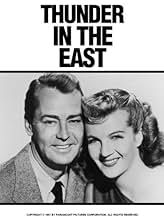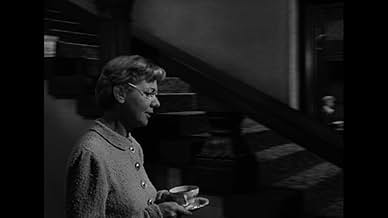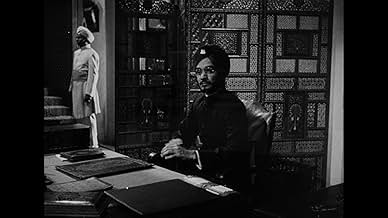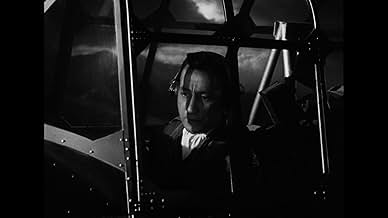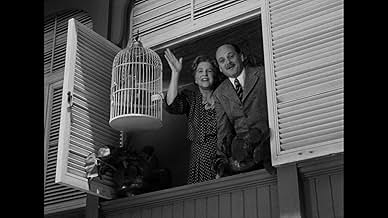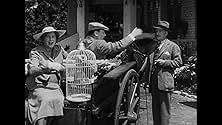In a remote region of post-independence India, the love of a blind British woman pricks the conscience of an arms dealer.In a remote region of post-independence India, the love of a blind British woman pricks the conscience of an arms dealer.In a remote region of post-independence India, the love of a blind British woman pricks the conscience of an arms dealer.
Marc Cavell
- Moti Lal
- (as Mark Cavell)
Charles Lung
- Maharajah
- (as Charlie Lung)
Frank Baker
- Englishman
- (uncredited)
Mohinder Bedi
- Palace Servant
- (uncredited)
Orlando Beltran
- Bus Driver
- (uncredited)
Bobker Ben Ali
- Azam Habibbudin
- (uncredited)
Benita Booth
- Englishwoman
- (uncredited)
Margaret Brewster
- Mrs. Corbett
- (uncredited)
Featured reviews
And one of Alan Ladd's best.
"Thunder in the East" boasts excellent direction by Charles Vidor, the camerawork of one of Hollywood's master cinematographers, Lee Garmes (who worked on most of the Von Sternberg-Dietrich masterpieces), and memorable performances by Ladd, Deborah Kerr, Charles Boyer, Cecil Kellaway, John Williams, and virtually everyone involved. The romance between Ladd and Kerr is poignant and unforgettable ("The awning is still blue."), and Kerr is a standout as a blind woman who's afraid to leave the city that she was born in, and knows so well that she can walk through as if she had sight.
The film's political message won't appeal to pacifists, and while there is only one real action scene at the end, the offscreen acts of violence leading up to it are extremely disturbing: a bus load of refugees, many of them children rides off with the children happily singing a song. We later hear that the bus was attacked and that everyone on board had been killed. An English couple attempts to evacuate by driving off in a horse and carriage, only to have their empty carriage return, and one of the main characters has his hand cut off by the bad guys (the attacking Muslim forces) in an attempt to persuade him into complying with their demands.
The open ending, described as "abrupt" in some of the other reviews is a decade ahead of its time. I like to think the odds are in favor of our heroes -- however the main point is that each of the men advancing toward the camera (the primary and secondary protagonists) has undergone a profound change in character as a result of the events they've become embroiled in.
Yes, the film feels a little like "Casablanca" at times (is this a bad thing?); and, no, it isn't quite as great as "Casablanca" (few films are); but while it's not as enjoyable, it's much darker, more realistic (in spite of being set in a fictional state), has a deeper, more profound message, and a much more adult approach. "Casablanca" works so well because the overriding air of cynicism is merely a pose -- with the two most jaded characters (Rick and Louis) finding a cause to believe in. "Thunder in the East" offers little in the way of hope -- only violence (with superior force) can save one from violence. And even then, the outcome remains unknown.
I've only given this film 9 stars because it never rises to the level of a cinematic masterpiece (like "The Third Man," "The Lady from Shanghai," "Orphee," "Meshes of the Afternoon," "The Seventh Seal," or "Shane") -- but for a "standard" Hollywood film, I rank this with the "Greats."
"Thunder in the East" boasts excellent direction by Charles Vidor, the camerawork of one of Hollywood's master cinematographers, Lee Garmes (who worked on most of the Von Sternberg-Dietrich masterpieces), and memorable performances by Ladd, Deborah Kerr, Charles Boyer, Cecil Kellaway, John Williams, and virtually everyone involved. The romance between Ladd and Kerr is poignant and unforgettable ("The awning is still blue."), and Kerr is a standout as a blind woman who's afraid to leave the city that she was born in, and knows so well that she can walk through as if she had sight.
The film's political message won't appeal to pacifists, and while there is only one real action scene at the end, the offscreen acts of violence leading up to it are extremely disturbing: a bus load of refugees, many of them children rides off with the children happily singing a song. We later hear that the bus was attacked and that everyone on board had been killed. An English couple attempts to evacuate by driving off in a horse and carriage, only to have their empty carriage return, and one of the main characters has his hand cut off by the bad guys (the attacking Muslim forces) in an attempt to persuade him into complying with their demands.
The open ending, described as "abrupt" in some of the other reviews is a decade ahead of its time. I like to think the odds are in favor of our heroes -- however the main point is that each of the men advancing toward the camera (the primary and secondary protagonists) has undergone a profound change in character as a result of the events they've become embroiled in.
Yes, the film feels a little like "Casablanca" at times (is this a bad thing?); and, no, it isn't quite as great as "Casablanca" (few films are); but while it's not as enjoyable, it's much darker, more realistic (in spite of being set in a fictional state), has a deeper, more profound message, and a much more adult approach. "Casablanca" works so well because the overriding air of cynicism is merely a pose -- with the two most jaded characters (Rick and Louis) finding a cause to believe in. "Thunder in the East" offers little in the way of hope -- only violence (with superior force) can save one from violence. And even then, the outcome remains unknown.
I've only given this film 9 stars because it never rises to the level of a cinematic masterpiece (like "The Third Man," "The Lady from Shanghai," "Orphee," "Meshes of the Afternoon," "The Seventh Seal," or "Shane") -- but for a "standard" Hollywood film, I rank this with the "Greats."
This film would have been more believable had it been set in Arizona or a similar location, where the "Foreign Leigion" is the US Cavalry, with Anthony Quinn the sergeant , the naughty natives were the Apaches ... and somehow a contrived "Lost City" was stumbled upon somewhere west of Tuscon !!
But "clean" , dry-skinned French cavalry stumbling over a "lost" city in Algeria (with Indian dances and a Maharaja !) and scantily-clad , beautifully-groomed liberal ladies must have raised a few eyebrows even in 1953 !
Still , I hope someone (s) made a small living out of this wasted effort in time and money.
But "clean" , dry-skinned French cavalry stumbling over a "lost" city in Algeria (with Indian dances and a Maharaja !) and scantily-clad , beautifully-groomed liberal ladies must have raised a few eyebrows even in 1953 !
Still , I hope someone (s) made a small living out of this wasted effort in time and money.
Simply a daft film... a very silly film. Ludicrous casting and script though the historical setting and subject matter has real possibilities. The ending was so ridiculously predictable. Alan Ladd playing a sort of B movie gun runner, Charles Boyer playing an Indian... the interest in this film being just how amusingly silly it was.
Thunder in the East is set in 1947 India ,immediately after being granted independence by Britain ,and in particular events are centred on the state of Ghandahar which is being menaced by brigands,well armed and with a political agenda. The Maharajah of the state is a dilettante playboy ,and his main adviser,played by a blacked up Charles Boyer,is a pacifist who will not countenance using force to resist the incursions of the brigands. Thus when arms entrepreneur Alan Ladd seeks to sell him guns and munitions to resist the enemies of the state he refuses and impounds the cargo.Ladd's existence is further complicated by his falling in love with Deborah Kerr,a blind British woman .who is caught up in the fate of the British community which is particularly under threat from the rebels. Things build to a final siege of the main hotel where the British dig in to resist Performances are okay although white actors blacked up now seems embarrassing ,and there is a touch of Casablanca about the storyline -cynical hero falling in love with an idealistic woman;contending political forces and a smarmy villain.Its nowhere near as good since script and cast are inferior .
Not bad but too stolid to be exceptional.
Not bad but too stolid to be exceptional.
Paramount must have had some trepidations about Thunder in the East as it was made in 1949 and held up in release for three years. Nat King Cole recorded the theme from Thunder in the East, a song called The Ruby and the Pearl three years earlier. It's quite a beautiful ballad and perfectly suited for Cole's voice, it's the best thing to come out of this routine action film.
Alan Ladd plays an arms dealer selling weaponry for the best price he can exact from the various sides in the Indian Civil War where the boundaries of India and Pakistan were settled in a lot of blood spilled. He's in Ghandahar province which has its rebel Moslem faction. He falls for Deborah Kerr the blind daughter of missionary Cecil Kellaway.
Ladd's got a silly playboy maharajah in Charles Lung to deal with and a prime minister for Ghandahar who is a disciple of Gandhi's non-violence philosophy. Charles Boyer as the prime minister doesn't want the weapons, but the rebel Moslems want them if for no other reason than to keep them out of Hindu hands and if they can't buy them, they'll take them by whatever means necessary.
The film tries to be a critique of Gandhi's non-violence code, but it doesn't rise above being an action/adventure story. The ending is a rather abrupt one and unconvincing. Still fans of the star players will probably like it.
Alan Ladd plays an arms dealer selling weaponry for the best price he can exact from the various sides in the Indian Civil War where the boundaries of India and Pakistan were settled in a lot of blood spilled. He's in Ghandahar province which has its rebel Moslem faction. He falls for Deborah Kerr the blind daughter of missionary Cecil Kellaway.
Ladd's got a silly playboy maharajah in Charles Lung to deal with and a prime minister for Ghandahar who is a disciple of Gandhi's non-violence philosophy. Charles Boyer as the prime minister doesn't want the weapons, but the rebel Moslems want them if for no other reason than to keep them out of Hindu hands and if they can't buy them, they'll take them by whatever means necessary.
The film tries to be a critique of Gandhi's non-violence code, but it doesn't rise above being an action/adventure story. The ending is a rather abrupt one and unconvincing. Still fans of the star players will probably like it.
Did you know
- TriviaFilm debut of Jill St. John.
- ConnectionsReferenced in O Espectador que o Cinema Esqueceu (1991)
- How long is Thunder in the East?Powered by Alexa
Details
Box office
- Gross US & Canada
- $2,000,000
- Runtime
- 1h 37m(97 min)
- Color
- Aspect ratio
- 1.37 : 1
Contribute to this page
Suggest an edit or add missing content

